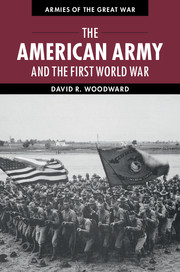Book contents
- Frontmatter
- Dedication
- Contents
- List of figures
- List of maps
- List of tables
- Preface
- List of abbreviations
- Introduction
- 1 Birth of a modern army
- 2 World war and American preparedness
- 3 Coercive power and Wilsonian diplomacy
- 4 “You’re in the army now”
- 5 US army doctrine and industrialized trench warfare
- 6 Over where?
- 7 American Expeditionary Force organization, overseas training, and deployment
- 8 Will the Americans arrive in time?
- 9 Failed expectations: “the military establishment of the United States has fallen down”
- 10 Atlantic ferry
- 11 Neck of the bottle
- 12 Uncertain times
- 13 Cantigny
- 14 Into the breach
- 15 American soldiers in north Russia and Siberia
- 16 The beginning of the end
- 17 Establishment of the American First Army and Saint-Mihiel
- 18 Meuse-Argonne, September 26–October 31
- 19 Breakout, November 1–11
- 20 Epilogue
- Notes
- Bibliography
- Index
20 - Epilogue
Published online by Cambridge University Press: 05 July 2014
- Frontmatter
- Dedication
- Contents
- List of figures
- List of maps
- List of tables
- Preface
- List of abbreviations
- Introduction
- 1 Birth of a modern army
- 2 World war and American preparedness
- 3 Coercive power and Wilsonian diplomacy
- 4 “You’re in the army now”
- 5 US army doctrine and industrialized trench warfare
- 6 Over where?
- 7 American Expeditionary Force organization, overseas training, and deployment
- 8 Will the Americans arrive in time?
- 9 Failed expectations: “the military establishment of the United States has fallen down”
- 10 Atlantic ferry
- 11 Neck of the bottle
- 12 Uncertain times
- 13 Cantigny
- 14 Into the breach
- 15 American soldiers in north Russia and Siberia
- 16 The beginning of the end
- 17 Establishment of the American First Army and Saint-Mihiel
- 18 Meuse-Argonne, September 26–October 31
- 19 Breakout, November 1–11
- 20 Epilogue
- Notes
- Bibliography
- Index
Summary
On November 17 the 28th Infantry, 1st Division, after its exhausting and helter-skelter march toward Sedan, was on the move again as part of the new Third Army, commanded by Major General Joseph T. Dickman, which had been organized at Ligny-en-Barrois between November 7 and November 15 to serve as the American Army of Occupation in Germany. At 8:00 a.m. the 28th Infantry crossed the old “no-man’s-land” near the town of Abancourt. Once past the “armistice line” the regiment marched through land scarred by war, ruined villages, and abandoned trenches. Soon soldiers encountered masses of French, Russian, and Italian POWs, released by the Germans, moving in the opposite direction. By the second day, the regiment began passing through pleasant French towns which had escaped the war’s destruction where joyous French civilians welcomed the Americans with open arms.
The Third Army’s destination was the Rhine and many soldiers wondered how they would be received on enemy soil. Under the terms of the Armistice the Allies gave the German Army thirty-one days to make a staged withdrawal to and just beyond the Rhine. It would not be the first and certainly not the last time that Washington deployed US troops to govern and police potentially hostile territory. Prior to becoming a belligerent in World War I the United States had deployed its soldiers on similar missions in Cuba, Puerto Rico, the Philippine Islands, Panama, Nicaragua, Mexico, Haiti, and the Dominican Republic, but never in the territory of a great power or on such a scale. It would be January 1923 before Washington brought the last American soldier home from their watch on the Rhine.
- Type
- Chapter
- Information
- The American Army and the First World War , pp. 381 - 395Publisher: Cambridge University PressPrint publication year: 2014



